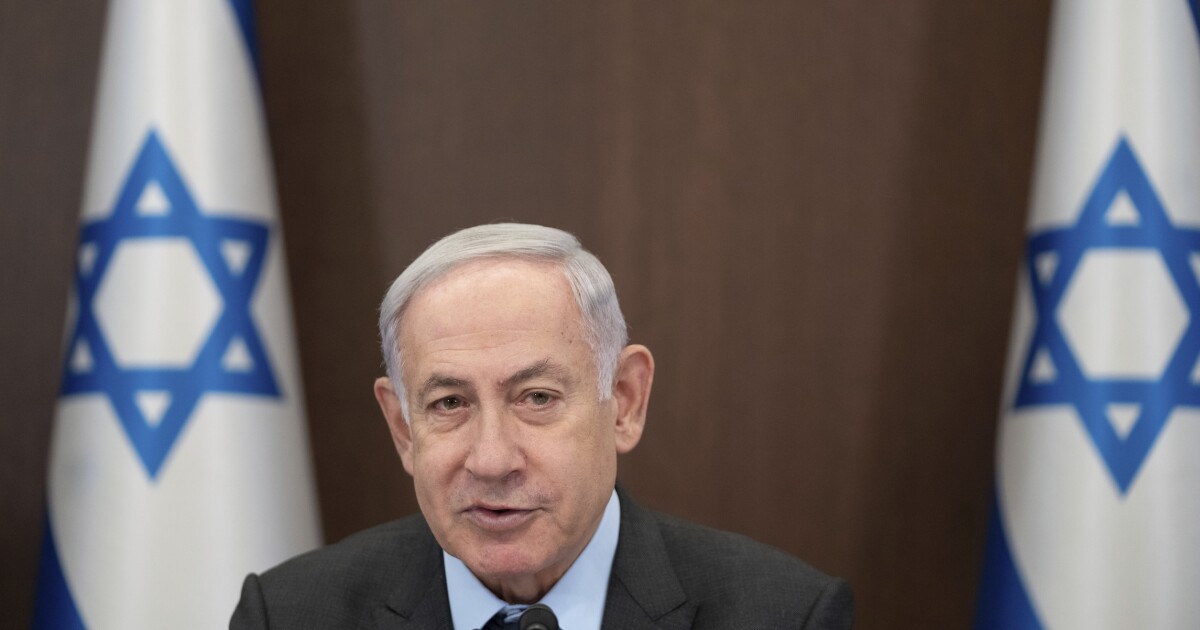

Israel’s president may be delivering an address before a joint meeting of Congress on Wednesday, but it is Benjamin Netanyahu who is top of mind for Democrats.
Isaac Herzog arrived in Washington this week, a visit marking the 75th anniversary of Israel’s founding. His role as president is largely ceremonial — Netanyahu, as the country’s prime minister, has led the government since returning to power in December.
REPUBLICANS BLAST DOE GAS STOVE PROPOSAL AS ‘ALARMING VIOLATION’ OF LAW
But Herzog was viewed as a more palatable choice to Democrats, who are furious over the expansion of Israeli settlements in the West Bank and Netanyahu’s plan to curb the power of Israel’s judiciary.
The visit afforded Democrats an opportunity to show bipartisan support for the Jewish state despite what the party sees as democratic backsliding — the president is more centrist than Netanyahu in both approach and tone. Yet the trip has become consumed by divisions over Israel.
Rep. Pramila Jayapal (D-WA), the top progressive in the House, called Israel a “racist state” over the weekend, setting off days of backlash.
Democratic leadership issued a joint statement rebuking Jayapal, as did a group of 43 House Democrats who called efforts to demonize Israel “dangerous and antisemitic.”
Nearly all Democrats affirmed that Israel is not a “racist or apartheid state” on Tuesday in a vote forced by Republicans. Yet the entire episode has only served to underscore tensions within the Democratic Party over Israel.
While Republicans increasingly offer their unqualified support for Israel, a trend that accelerated under former President Donald Trump, the Democrats hew to the stated U.S. policy of a two-state solution and, by and large, express more sympathy for the Palestinians.
The party sees Netanyahu, who has been in and out of power for decades, as an obstacle to Palestinian statehood, citing his nationalist policies. His proposed judicial reforms, meant to reinforce his coalition’s power, have further inflamed tensions.
House Democrats have voiced varying degrees of criticism at the prime minister. Leadership, even as it reaffirmed its “ironclad” support for Israel this week, diplomatically noted it “strongly disagrees” with “individual members of the current Israeli governing coalition.”
Jayapal’s criticisms were more pointed — she apologized for calling the Jewish state itself racist but “clarified” that the government is run by “extreme racists.”
The decision to invite Herzog, who unsuccessfully tried to steer Netanyahu toward a compromise on the judicial reforms, has not placated the hard-line members of the Democratic conference, whom Republicans believe are animated by antisemitism, or at least anti-Israel sentiment, not a problem with the Israeli Right.
At least five progressives, all members of the “Squad,” plan to skip the address on Wednesday, citing what they see as human rights abuses.
“There is a particular type of left-wing radical that is so obsessed with the state of Israel that they conduct themselves in ways they would not with any other nation,” Sen. J.D. Vance (R-OH) told the Washington Examiner. “You don’t have to agree with every policy of the state of Israel, but to boycott the president coming in — it’s just ridiculous theater.”
Yet for mainstream Democrats, the conflict with Netanyahu is one of personality and policy. Rep. Nancy Pelosi (D-CA), the former speaker of the House, called Herzog a “really great person” on Tuesday and rebuked the Squad for skipping the address.
But even Pelosi, one of the strongest supporters of Israel in Congress, expressed disdain for Netanyahu. “I wouldn’t feel the same way about the prime minister,” she told Fox News of her excitement for Herzog’s visit.
The tensions are not new and predate the judicial reforms. Netanyahu was notoriously at odds with President Barack Obama over the Iran nuclear deal, a policy he denounced the last time he spoke before Congress in 2015.
Nearly 60 Democrats, upset that then-Speaker John Boehner had not notified the White House of the invitation first, skipped the speech that year, among them Joe Biden, who was vice president at the time.
Biden’s relationship with Netanyahu is perhaps even cooler today. He’s called the prime minister’s Cabinet extreme, and it wasn’t until Monday that the two leaders agreed to meet. It’s not yet clear Netanyahu will be invited to the White House when he does visit the United States later this year.
The Biden administration has sought to steer Netanyahu toward compromise on his proposed judicial reforms, saying their relationship is based on an adherence to their shared democratic principles.
But Democrats have avoided pushing too hard, at least in public. The emphasis for House leaders has been demonstrating that the party still stands by Israel despite a small but growing crop of lawmakers who are fiercely critical.
CLICK HERE TO READ MORE FROM THE WASHINGTON EXAMINER
Just nine members voted against the resolution on Tuesday, and Rep. Pete Aguilar (CA), the No. 3 Democrat in the House, predicted that few will skip Wednesday’s address.
“There’s unity in the Democratic caucus,” Aguilar told reporters. “I think you’ll see that with strong attendance from our colleagues on the House floor to see the president of Israel address us.”






